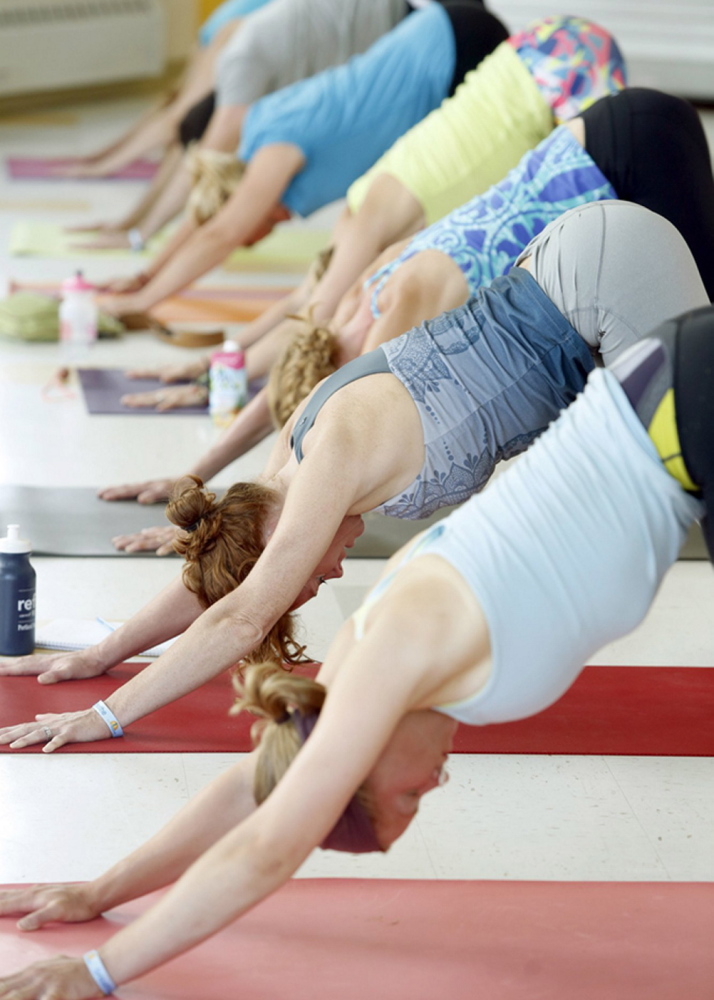BIDDEFORD — Most single women find time to work out. But to vote? Not so much. And that fact might determine the outcome of this year’s presidential election, including the electoral votes here in Maine.
Is it possible to turn their exercise habit into a voting habit? We examined whether single women’s dedication to fitness could be used to encourage them to vote, and got very interesting results. Single women might be the most important voting bloc in the coming election between Hillary Clinton and Donald Trump.
The good news for Clinton is that unmarried women, who represent half of all women and a quarter of the population, strongly favor her in polls.
In 2012, Barack Obama won the single women’s vote by 36 percent, and polls suggest that Clinton could do even better with this group. The good news for Trump is that unmarried women don’t vote in great numbers. According to the Census Bureau, in the 2012 election, single women were 20 percent less likely to vote than married women.
We performed a field experiment to examine whether new techniques might be effective in getting single women to vote. We did it in an unusual place: cardio-kickboxing class.
Group membership, especially in churches and civic organizations, has long been associated with voting. Our experiment suggests that single women’s vote turnout can be significantly (even dramatically) increased if they encounter information and encouragement regarding citizenship and voting in the group they are often most dedicated to: their workout class.
We focused on cardio-kickboxing for several reasons. Most importantly, fitness classes are among the few groups that single women join in large numbers. In many ways, single women have the characteristics of people who participate most readily in voting – unmarried women are on average more educated than single men, more likely to work full time and more likely to be raising children. These are the same reasons why unmarried women often feel too busy to belong to traditional civic or church groups, which tend to encourage voting.
But when it comes to dedication to their workout classes, you could almost say women are religious about it. In fact, divinity scholars have suggested that for secular Americans, fitness classes and gyms have begun to replace traditional religion and churches – providing a sense of community, a path to self-transformation and a sense of accountability.
Taking advantage of the fact that one of us (Megan) was the instructor for three cardio kickboxing classes full of unmarried women, we did a field experiment during the 2014 midterm elections. One class we left “untreated” – they just worked out. For a second class, we devised a plan to encourage civic engagement that we called “the church approach.” We used the model of some church groups and the way they encourage voting, but updated the approach to reflect the gym environment.
Before and after class and during breaks, Megan brought up the coming election frequently and enthusiastically. She connected women’s taking control of their bodies and their physical space to the idea of participating in choosing our leaders. She got a little preachy, as appropriate to a “church” approach. She brought in voter registration cards. She suggested carpooling to the polls.
For comparison’s sake, we gave a third kickboxing class a different treatment – one based in recent political science research regarding unobtrusive “nudges” that encourage voting. Megan made registration cards available, and she offered various dispassionate reminders about the election.
After the election, we verified the voting records of the classes at town hall. We found that the treatments had statistically significant and quite striking results for both groups – the church group and the nudge group each had a vote turnout over 20 percent greater than the rate of the untreated class Many of the women voted for the first time in their lives. So these results are doubly encouraging. Classes like cardio-kickboxing are a promising place to find unmarried women and encourage them to vote.
Follow-up interviews suggest that the women were not annoyed by the intrusion of politics into their workouts, even in the “church” group. The connection between two kinds of empowerment and taking control – working out and speaking out with a vote – made sense to them.
But the results also suggest that it is not necessary for class leaders to get “preachy” about it if they don’t want to. Some simple nudges work as well. But Megan found the “church” group more fun, and the women found it more inspiring. They were more likely to say they expected to keep voting in future elections.
Our research suggests that the Democrats would be wise to enlist fitness instructors into their efforts to turn out the vote among unmarried women – and the more enthusiastic, the better.
Send questions/comments to the editors.


